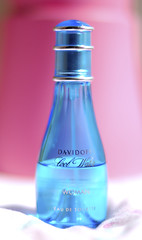- in Natural Beauty by Author
- |
- 1 comments
Fragrance – Is It Natural?
By Jane Thurnell-Read
95% of chemicals used in fragrances are synthetic compounds derived from petroleum. It has been estimated that more than 3000 different chemicals are used in fragrance production. Do these figures shock you? Yes, manufacturers are very clever – we see the packaging and the adverts showing flowers and nature, and we assume (as the manufacturer intends us to assume) that the fragrance in the product is derived from nature, but most fragrances are chemically derived. They do not use essential oils because they are too expensive. They do use synthetic chemicals because they are cheap.
We are exposed to perfume or fragrance throughout the day. We may not wear perfume ourselves, but our shampoo, soap, shower gel and cosmetics are likely to contain synthetic perfumes, unless we look at the label and shop carefully.
We encounter more smells in our household products – cleaners, washing powders, polish, air fresheners, etc. If we go out, we experience these smells on other people and in offices and stores.
Perfume mixes added to products are listed in the ingredients as ‘parfum’ or ‘fragrance’ depending on the part of the world you live in. Even some products that appear to be unperfumed will contain synthetic perfumes in order to cover an unpleasant odour from one of the active ingredients, or to ensure that the product always smells the same. The exact composition of these may vary over time even for the same product, as the manufacturer adjust the fragrance mix in relation to variations in the smell of the raw ingredients.
[ad#ad-2]
Even some essential oils are not entirely natural, as harsh chemicals may be used in their extraction process. Chemical solvents such as hexane and heptane are used to extract the maximum amount of oil from the plant, so it is important to buy good quality oils from a source you trust.
Allergies to fragrances are very common. The main organs affected are the skin and the respiratory system, but neurological damage has also been reported. Some people feel that we should have a right to fragrance-free air as well as tobacco-smoke-free air. There are also concerns about the impact of synthetic chemicals on the environment, as they do not necessarily break down easily.
Of course, there is a role for fragrance. The power of aromatherapy oils to heal and lift the spirits is well documented, but the widespread use of synthetic fragrances should be seen as pollution of both our bodies and our environments.
About the Author: Jane Thurnell-Read is a writer and researcher on health, stress, allergies, happiness and alternative medicine. More of her writing can be viewed at https://www.healthandgoodness.com
Source: www.isnare.com
If you liked this post, submit your email address below to get new posts by email:

